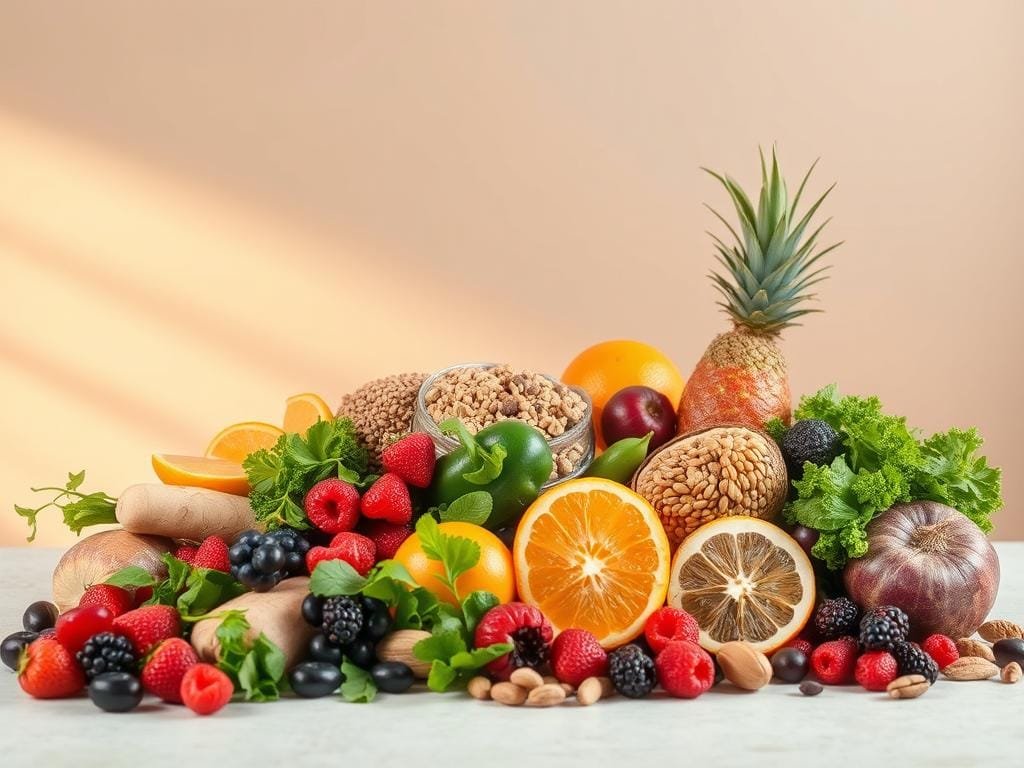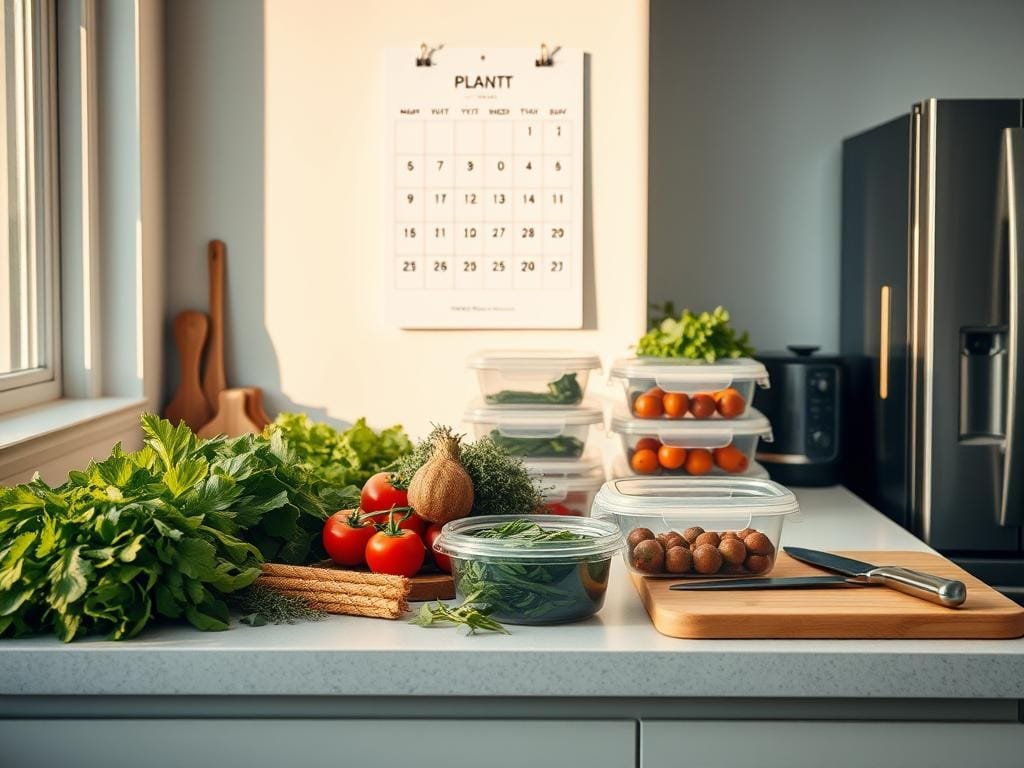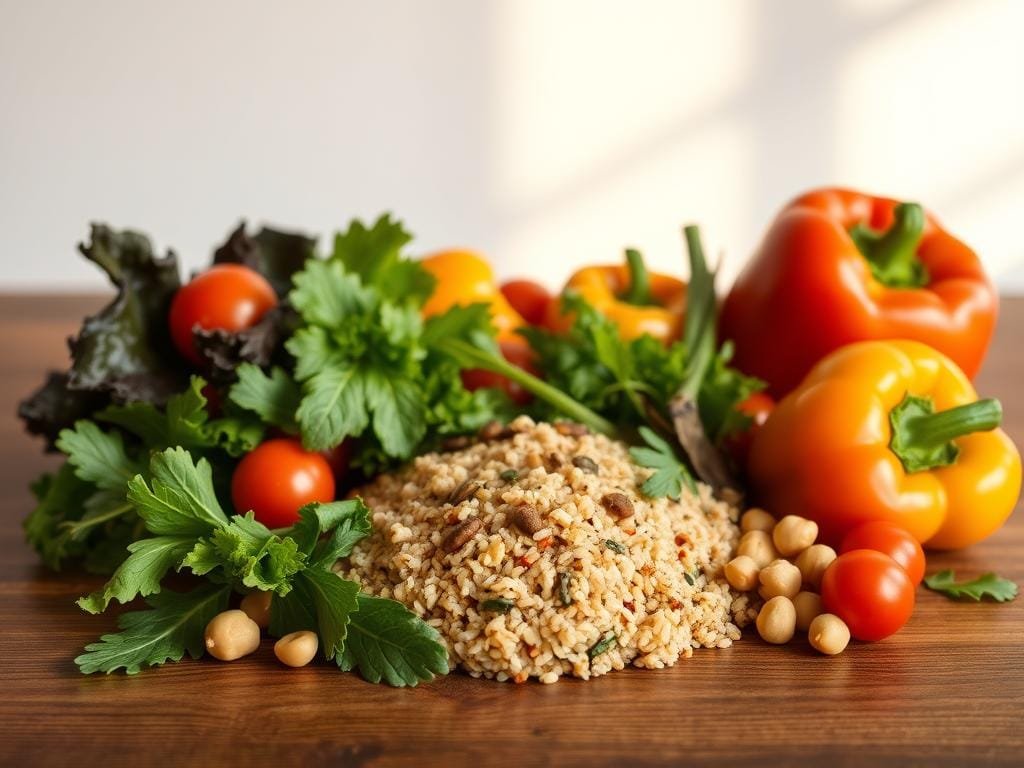Did you know a vegan diet can lower the risk of chronic diseases and boost your health? As more people choose plant-based eating, learning to thrive on a vegan diet is key.
A well-planned vegan diet is good for your health and the planet. By focusing on personalized nutrition, you can make your vegan diet fit your needs. This ensures you get the best from your plant-based lifestyle.
For more info on healthy and organic food recipes for your vegan diet, check out our guide on healthy organic food recipes.
Table of Contents
Key Takeaways
- Understand the benefits of a vegan diet for your health and the environment.
- Learn how to tailor your vegan diet to your individual nutritional needs.
- Discover the importance of personalized nutrition in a vegan lifestyle.
- Explore healthy and organic food recipes to complement your vegan diet.
- Start your journey to thriving on a vegan diet with confidence.
Understanding Personalized Nutrition and Its Importance
Personalized nutrition is key to getting the most from a vegan diet. It’s tailored to your unique needs. As you start a vegan lifestyle, it’s vital to tailor your diet to your health needs.
What is Personalized Nutrition?
Personalized nutrition means making a diet plan just for you. It looks at your health, lifestyle, and what you like to eat. It also considers your genes and health goals.
By focusing on individualized nutrition plans, you can tackle health issues and feel better. This way, your vegan diet meets your specific needs.
Benefits of Tailoring Your Diet
Customizing your diet has many benefits. It can lead to better health and a balanced diet. A personalized nutrition plan helps you:
- Fix nutritional gaps
- Improve your health
- Feel better overall
For more on essential nutrients, check out this resource. It explains the basics of a balanced vegan diet.
How It Differs from General Nutrition Advice
Personalized nutrition is different from general advice. It’s made just for you, based on your health, lifestyle, and what you like. It gives you specific tips.
| Aspect | General Nutrition Advice | Personalized Nutrition |
|---|---|---|
| Approach | One-size-fits-all | Tailored to individual needs |
| Considerations | General dietary guidelines | Health status, lifestyle, genetic predispositions |
| Outcome | General health improvement | Optimized health outcomes |
Choosing personalized nutrition can greatly improve your health and happiness.
Assessing Your Nutritional Needs
Your nutritional needs are unique. Assessing them is the first step to a thriving vegan lifestyle. Understanding your individual nutritional requirements is key for optimal health as you adopt a vegan diet.
Factors Influencing Your Nutritional Requirements
Several factors affect your nutritional needs. These include age, health status, lifestyle, and activity level. For example, an athlete might need more protein for muscle repair and growth. An older adult might need more calcium for bone density.
Key factors that influence nutritional requirements:
- Age: Nutritional needs change as you age.
- Health Status: Certain health conditions may require adjustments in your diet.
- Lifestyle: Active individuals may have different needs compared to those who are less active.
- Activity Level: Athletes or those with physically demanding jobs may require more calories and specific nutrients.

Conducting a Nutritional Assessment
Conducting a nutritional assessment involves evaluating your current diet, lifestyle, and health status. This helps identify areas for improvement. You can do this through a detailed questionnaire or a food diary that tracks your eating habits over time.
A thorough nutritional assessment helps you understand your dietary needs. It allows you to make informed decisions about your vegan diet. As a registered dietitian notes, “A well-conducted nutritional assessment is the foundation of a successful personalized nutrition plan.”
“The key to a successful vegan diet is not just about cutting out animal products, but ensuring you’re getting the right balance of nutrients.”
The Role of Consultations with Professionals
Consulting with healthcare professionals, such as registered dietitians or nutritionists, offers valuable insights. They can provide personalized health recommendations based on your unique circumstances. This helps you create an individualized nutrition plan.
| Professional | Role | Benefits |
|---|---|---|
| Registered Dietitian | Provides personalized dietary advice | Helps create a tailored meal plan |
| Nutritionist | Offers guidance on nutrient intake | Assists in optimizing nutrient balance |
By assessing your nutritional needs and consulting with professionals, you can ensure your vegan diet is satisfying and nutritionally balanced.
Essential Nutrients in a Vegan Diet
A well-planned vegan diet is key to ensuring you get all the necessary nutrients for optimal health. When adopting a vegan lifestyle, it’s vital to pay attention to certain nutrients that are vital for your body’s functions.
Key Nutrients to Focus On
Individuals following a vegan diet need to be mindful of several key nutrients. These include vitamin B12, which is vital for nerve function and the production of red blood cells. Iron is also essential for healthy red blood cells. Omega-3 fatty acids, like EPA and DHA, are important for heart health and brain function. You can find more information on these nutrients and their importance in a recent study on vegan nutrition.
Meal Planning for Nutrient-Dense Options
Effective meal planning is the cornerstone of a balanced vegan diet. You should focus on incorporating a variety of whole, plant-based foods into your meals. Legumes, such as lentils and chickpeas, are not only rich in protein but also in fiber and essential minerals. Whole grains like quinoa and brown rice provide sustained energy and are rich in vitamins and minerals. Leafy greens, including kale and spinach, are packed with vitamins A, C, and K, as well as minerals like calcium and iron.
To ensure you’re getting a broad spectrum of nutrients, consider meal prepping or batch cooking. This can help you maintain a consistent intake of nutrient-dense foods and reduce the likelihood of relying on processed or convenience foods.
Supplements: When and Why to Consider Them
While a well-planned vegan diet can provide most of the necessary nutrients, there are instances where supplements may be necessary. For example, vitamin B12 is not naturally found in plant-based foods, so a supplement or fortified foods are recommended. If you’re not consuming enough omega-3 rich foods, such as walnuts or flaxseeds, you might consider an algae-based omega-3 supplement.
It’s also important to consult with a healthcare professional or a registered dietitian who can provide personalized advice based on your nutritional needs and health status. They can help determine if supplements are needed and which ones are appropriate for you.
Delicious Plant-Based Foods to Incorporate
Focus on personalized nutrition to make your vegan diet better. A good vegan diet is not just about avoiding animal products. It’s about eating a variety of foods that are good for you.

Legumes: The Protein Powerhouses
Legumes are key in a vegan diet. They are full of protein, fiber, and important nutrients. You can add them to many dishes, like lentils in soups or black beans in tacos.
For more ideas, check out Love and Lemons. They show how versatile legumes are in plant-based cooking.
Whole Grains: Sustain Your Energy
Whole grains are essential for a balanced vegan diet. They give you lasting energy and lots of nutrients. Foods like quinoa and brown rice are not only filling but also full of fiber and vitamins.
Eating different whole grains helps keep your energy up and supports your digestion.
Leafy Greens: Vital for Overall Health
Leafy greens like kale and spinach are full of vitamins and minerals. They are great for your bones and immune system. Adding them to your meals makes your vegan diet even healthier.
Overcoming Common Myths About Vegan Diets
There’s a lot of wrong information about vegan diets. Many people think they’re not good for you because of this. Let’s look at some common myths and the truth behind them.
Debunking Misconceptions on Protein Sources
Many think vegan diets don’t have enough protein. But, many plant-based foods are full of protein. You can get all the protein you need without eating animals. Foods like lentils, chickpeas, tofu, and tempeh are great sources.
For example, a cup of cooked lentils has about 18g of protein. A cup of chickpeas has around 15g. Eating a variety of these foods ensures you get enough protein. You can also check out this guide for more tips on vegan diets.
The Truth About Iron and Veganism
Some think vegans are more likely to have iron deficiency. It’s true that plant-based iron isn’t absorbed as well as animal iron. But, you can improve absorption by eating foods high in vitamin C with iron-rich foods. For example, eating citrus fruits or bell peppers with spinach or beans helps.
Understanding Calcium in Plant-Based Diets
Many think vegans don’t get enough calcium because it’s in dairy. But, many plant-based foods are full of calcium. Foods like fortified plant milk, dark leafy greens, and tofu are good sources. Eating a variety of these foods ensures you get enough calcium.
Here’s a comparison of calcium content in some vegan foods:
| Food | Serving Size | Calcium Content (mg) |
|---|---|---|
| Fortified Plant Milk | 1 cup | 300 |
| Kale | 1 cup cooked | 200 |
| Tofu | 3 oz | 250 |
| Broccoli | 1 cup cooked | 70 |
Knowing the truth about these myths lets you confidently start a vegan diet. A personalized nutrition plan can help make sure your diet meets your needs. This way, you can thrive on a vegan lifestyle.
Meal Preparation and Planning Strategies
To thrive on a vegan diet, mastering meal planning is key. Good meal prep saves time and money and ensures you get the nutrients you need. Planning your meals helps you avoid unhealthy choices.
Tips for Effective Meal Prep
Set aside a day for meal prep, like the weekend. Make a meal calendar for the week. This keeps you organized and on track with your diet.
- Plan meals around seasonal produce for freshness and variety.
- Make a grocery list from your meal plan to avoid impulse buys.
- Explore meal prepping strategies that fit your lifestyle, like batch cooking or portioning.
Batch Cooking: Save Time and Money
Batch cooking saves time and money. Cooking big batches of ingredients or meals reduces waste and prepares healthy meals for the week.
Some tips for batch cooking include:
- Cook grains and legumes in bulk for various meals.
- Roast a lot of vegetables for sides or adding to meals.
- Make a big batch of soup or stew for reheating all week.

Personalized Meal Plans That Work for You
A personalized meal plan meets your nutritional needs and preferences. Start by assessing your dietary needs and likes. Think about your activity level, food allergies, and taste.
For a customized plan, talk to a registered dietitian or nutritionist. They can help craft an individualized nutrition plan. Their expertise ensures your vegan diet is balanced and satisfying.
Building a Balanced Plate
Getting a balanced vegan diet means focusing on variety, portion control, and mindful eating. A well-crafted vegan meal can provide all the necessary nutrients while delighting your taste buds.
The Components of a Well-Rounded Vegan Meal
A balanced vegan plate typically includes a mix of different food groups. You should aim to include:
- A source of protein like legumes or tofu
- Whole grains for sustained energy
- A variety of vegetables for essential vitamins and minerals
- Healthy fats from nuts, seeds, or avocados
This combination ensures you’re getting a broad spectrum of nutrients.

Portion Control and Mindful Eating
Paying attention to portion sizes is key for a balanced diet. Eating mindfully lets you enjoy your food and know when you’re full. This helps prevent overeating.
Tips for mindful eating include:
- Eating slowly and savoring your food
- Paying attention to hunger and fullness cues
- Avoiding distractions like TV or smartphones during meals
Experimenting with Flavors and Textures
One of the joys of a vegan diet is exploring a wide range of flavors and textures. Don’t be afraid to try new ingredients and recipes to keep your meals interesting and enjoyable.
Some ways to add variety include:
- Incorporating different spices and herbs to enhance flavor
- Trying various cooking methods like roasting or grilling
- Adding nuts or seeds for crunch
Staying Motivated on Your Vegan Journey
Staying motivated is key when you’re on a vegan journey. Embracing veganism is a big commitment. Keeping your enthusiasm and dedication is important for enjoying its benefits.
Setting Achievable Goals
Setting realistic goals is essential for your vegan journey. By setting achievable milestones, you can track your progress and stay motivated. Try setting specific, measurable goals, like trying new vegan recipes each week or attending vegan events.
- Start with small, manageable changes to your diet and lifestyle.
- Celebrate your successes, no matter how small they may seem.
- Be patient with yourself as you work towards your goals.
Finding Your Vegan Community
Finding like-minded individuals is a great way to stay motivated. Look for local vegan groups, online forums, or social media communities. Here, you can share experiences, ask questions, and find support.
Some ways to find your community include:
- Joining vegan meetups or events in your area.
- Participating in online vegan forums or social media groups.
- Attending vegan cooking classes or workshops.
Tracking Your Progress
Keeping a food diary is a great way to monitor your progress and stay motivated. By recording your meals, you can identify patterns, track your nutrient intake, and make informed decisions about your diet.
Consider the following when keeping your food diary:
- Record your meals and snacks to track your daily nutrient intake.
- Note how different foods make you feel.
- Use this information to adjust your diet and ensure you’re meeting your nutritional needs.
Adapting to Dining Out and Social Situations
Dining out and going to social events don’t have to stop you from following a vegan diet. With a few simple tips, you can stay on track. You’ll face many situations where you need to choose what to eat.
Tips for Eating Vegan at Restaurants
Going to restaurants as a vegan can be tough, but many places now have vegan options. Here are some tips to make eating out fun:
- Research Ahead: Look up restaurants online and check their menus for vegan options. Many websites and apps can help you find vegan-friendly places.
- Communicate Clearly: Tell your server about your dietary preferences and ask for recommendations. They can often guide you to suitable dishes or offer to modify a meal to suit your needs.
- Be Open to Modifications: Many dishes can be adapted to be vegan. Don’t hesitate to ask for changes, such as substituting dairy with a non-dairy alternative.
Navigating Social Events and Gatherings
Social events can be tricky, but there are ways to stay true to your vegan diet while enjoying the occasion.
- Offer to Bring a Dish: By bringing a vegan dish to share, you ensure there’s something you can eat, and it also helps others discover vegan cuisine.
- Ask the Host: If you’re attending a potluck or dinner party, ask the host if there’s a vegan option available or if you can contribute a dish.
- Eat Before You Go: If you’re unsure about the food options, consider eating a meal before you attend the event.
How to Communicate Your Dietary Choices
Effectively communicating your dietary choices is key to maintaining your vegan lifestyle in social situations.
When explaining your choices, you can say something like, “I’ve chosen a vegan diet for my health and wellbeing, and I’m finding it really beneficial.” Being clear and confident can help others understand and respect your decision.
By being prepared and communicating your needs, you can enjoy social gatherings and dining out while staying true to your vegan diet.
Resources for Continued Learning
As you keep going on your vegan path, it’s key to stay updated and motivated. There are many resources out there to help you learn more about personalized nutrition. This way, you can keep your vegan diet balanced and healthy.
Recommended Reading
Check out books and cookbooks that focus on vegan nutrition and meal planning. Famous authors and publications can share important insights. They can help you understand nutritional assessment and plan a complete vegan diet.
Influential Online Resources
Look at trusted vegan websites and blogs for tips on meal prep, nutrition, and personalized plans. These sites keep you in the loop with the newest vegan research and trends.
Tracking Your Progress
Use apps to track your nutritional intake and see how you’re doing on a vegan diet. These tools help you keep your diet balanced. They also help you reach your health goals with personalized nutrition.
